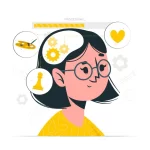Jean Piaget
Jean Piaget (1896-1980) was a Swiss psychologist known for his groundbreaking work in child development. He proposed a theory of cognitive development which suggested that children progress through distinct stages of cognitive development, each characterized by different ways of thinking and understanding the world. Piaget’s theory emphasized the active role of children in constructing their understanding of the world through interactions with their environment. His research has had a profound influence on fields such as psychology, education, and developmental biology. Piaget’s work laid the foundation for understanding how children learn and develop intellectually.
Biography of Jean Piaget
Birth of Jean Piaget
Jean Piaget was born on August 9, 1896, in Neuchâtel, Switzerland. He was the oldest child of Arthur Piaget, a professor of medieval literature, and Rebecca Jackson, who was highly interested in his son’s intellectual development. Piaget’s early experiences, including his fascination with biology and the natural world, influenced his later work in psychology. His interest in studying children’s development began during his undergraduate years, and he went on to become one of the most influential psychologists of the 20th century.
Early life of Jean Piaget
Jean Piaget spent his early years in Neuchâtel, Switzerland. Born into an intellectually stimulating environment, his parents, Arthur Piaget and Rebecca Jackson, were both highly interested in education and encouraged their children’s intellectual curiosity. Piaget showed early signs of intelligence and curiosity, displaying a particular interest in biology and the natural sciences.
During his childhood, Piaget’s early experiences, such as exploring nature and observing animal behavior, greatly influenced his later work in psychology. He attended the University of Neuchâtel, where he initially studied zoology and philosophy before focusing on psychology. It was during his time as a student that Piaget began to explore the development of children’s minds, laying the groundwork for his future career as a pioneering developmental psychologist.
Piaget’s upbringing in a nurturing and intellectually stimulating environment played a significant role in shaping his interests and ultimately led him to make groundbreaking contributions to the understanding of child development.
Education of Jean Piaget
Jean Piaget’s education played a crucial role in shaping his career as a pioneering psychologist. He attended the University of Neuchâtel in Switzerland, where he initially studied zoology and philosophy. Piaget was particularly interested in biology and the natural sciences, which would later influence his work in psychology.
During his time at the University of Neuchâtel, Piaget became increasingly intrigued by the study of psychology. He worked as an assistant to Alfred Binet, a renowned psychologist known for his work in intelligence testing. This experience further fueled Piaget’s interest in the development of the human mind.
After completing his undergraduate studies, Piaget pursued a Ph.D. in natural sciences at the University of Neuchâtel. His doctoral thesis focused on mollusks, specifically their biological classification. While Piaget’s early research was in biology, his interest in the development of knowledge and understanding in children led him to shift his focus to psychology.
Throughout his career, Piaget continued to explore the cognitive development of children, conducting extensive research that laid the foundation for his influential theory of cognitive development. His interdisciplinary education in biology, philosophy, and psychology provided him with a unique perspective that informed his groundbreaking work in understanding how children construct knowledge about the world.
Relation of Jean Piaget with his parents
Jean Piaget had a close relationship with his parents, Arthur Piaget and Rebecca Jackson. His parents were supportive of his intellectual pursuits and provided him with a nurturing environment that encouraged curiosity and exploration. Arthur Piaget, a professor of medieval literature, and Rebecca Jackson, with her keen interest in her son’s intellectual development, fostered an environment that valued education and inquiry.
Piaget’s parents played a significant role in shaping his early interests and intellectual development. Their encouragement and support likely contributed to his curiosity about the natural world and his eventual exploration of psychology and child development.
Throughout his life, Piaget maintained a close connection with his family, often drawing on his childhood experiences and interactions with his parents in his research and writings. His upbringing in a stimulating and supportive environment undoubtedly influenced his work as a psychologist and his understanding of the development of children’s minds.
Marital life of Jean Piaget
Jean Piaget married Valentine Châtenay in 1923. Valentine was a psychologist and a researcher herself, and their marriage lasted until Piaget’s death in 1980. They had three children together: Jacqueline, Lucienne, and Laurent.
Valentine Piaget collaborated with her husband on some of his research projects and shared his interest in psychology and child development. While Jean Piaget is renowned for his groundbreaking work in cognitive development, his wife’s contributions to their personal and professional life are notable as well.
Their marriage provided Piaget with a supportive partnership, allowing him to pursue his research and academic career while also raising a family. Although Jean Piaget’s work often took him away from home for extended periods, particularly during his research expeditions, his marriage to Valentine remained strong throughout their lives.
Overall, Jean Piaget’s marital life with Valentine Châtenay was characterized by mutual support, shared intellectual interests, and a commitment to family.
Social life of Jean Piaget
Jean Piaget’s social life was influenced by his academic pursuits and his passion for intellectual exchange. He was deeply engaged in the academic community throughout his career, collaborating with other psychologists, educators, and researchers from around the world.
Piaget was known to have a circle of colleagues and collaborators with whom he shared ideas and discussed his research. He was also a prolific writer and speaker, often attending conferences and giving lectures on his theories of cognitive development.
In addition to his professional interactions, Piaget had a close-knit family and maintained strong relationships with his wife, Valentine, and their three children. Despite his demanding career, Piaget valued spending time with his family and often drew on his observations of children, including his own, in his research.
Piaget’s social life also extended beyond academia. He was interested in art, music, and literature, and he engaged with cultural activities that enriched his understanding of human development and behavior.
Overall, Jean Piaget’s social life was multifaceted, encompassing professional collaborations, family relationships, and a broader engagement with the world of ideas and culture. His interactions with others undoubtedly contributed to his own intellectual development and the impact of his work on the field of psychology.
Followers of Jean Piaget
Jean Piaget’s theories on cognitive development and his research findings have attracted a wide range of followers, including psychologists, educators, researchers, and practitioners in various fields. Some of the notable followers and individuals influenced by Piaget’s work include:
- Lev Vygotsky: A Soviet psychologist known for his sociocultural theory of cognitive development, Vygotsky’s ideas were developed independently but share some similarities with Piaget’s theories. Vygotsky’s work emphasizes the role of social interaction and cultural context in cognitive development.
- Jerome Bruner: An American psychologist who made significant contributions to cognitive psychology and educational theory. Bruner’s theories, particularly his concept of “scaffolding” in learning, were influenced by Piaget’s ideas on cognitive development.
- Lawrence Kohlberg: An American psychologist known for his theory of moral development, which was inspired by Piaget’s work on cognitive development. Kohlberg extended Piaget’s ideas to propose a stage theory of moral reasoning.
- John Flavell: An American psychologist who conducted research on cognitive development, particularly in the areas of metacognition and theory of mind. Flavell’s work built upon Piaget’s theories of cognitive development, exploring how children develop an understanding of their own thought processes and the mental states of others.
- Constructivist educators: Piaget’s ideas have had a significant impact on educational theory and practice, particularly in constructivist approaches to teaching and learning. Educators who subscribe to constructivist principles often draw upon Piaget’s theories to inform their instructional methods and curriculum development.
These are just a few examples of the many individuals and groups who have been influenced by Jean Piaget’s work. His theories continue to be widely studied and applied in various fields, shaping our understanding of human development and informing educational practices around the world.
Clinical practice of Jean Piaget
Jean Piaget’s contributions to clinical practice primarily revolve around his theoretical framework of cognitive development and how it can inform understanding and interventions for children with developmental issues or learning difficulties. While Piaget himself was not a clinician in the traditional sense, his research and theories have had a profound impact on the field of developmental psychology and child psychology, influencing clinical practice in several ways:
- Assessment: Piaget’s stages of cognitive development provide a framework for understanding typical patterns of intellectual growth in children. Clinicians can use Piagetian tasks and methods to assess a child’s cognitive abilities and identify potential areas of strength or difficulty.
- Diagnosis: Piaget’s theories help clinicians recognize atypical patterns of cognitive development and diagnose conditions such as intellectual disabilities or developmental disorders like autism spectrum disorder. Understanding a child’s stage of cognitive development can inform diagnostic evaluations and treatment planning.
- Intervention: Piaget’s emphasis on the active role of children in constructing their understanding of the world suggests that interventions should be tailored to a child’s developmental level. Clinicians may use Piagetian principles to design educational and therapeutic interventions that promote cognitive growth and address specific challenges or deficits.
- Parent and caregiver education: Piaget’s theories can help parents and caregivers understand the importance of providing developmentally appropriate experiences and support for children. Clinicians may incorporate Piagetian concepts into parent education programs to help caregivers better understand their child’s cognitive development and how to facilitate learning and growth.
- Research and theory development: Piaget’s research laid the groundwork for subsequent studies in developmental psychology, informing our understanding of cognitive development across the lifespan. Clinicians may draw on Piaget’s theories and methodologies in their own research to further advance the field and improve clinical practice.
Overall, while Jean Piaget was not directly involved in clinical practice, his theories have had a significant influence on how clinicians understand and support children’s cognitive development and address developmental challenges in clinical settings.
Death of Jean Piaget
Jean Piaget, the Swiss psychologist renowned for his groundbreaking work in child development and cognitive psychology, passed away on September 16, 1980, in Geneva, Switzerland. He was 84 years old at the time of his death. Piaget’s contributions to the understanding of human intelligence and the development of children’s minds continue to have a profound impact on psychology, education, and related fields.
What were some significant events and experiences in Jean Piaget’s life that influenced his work?
Several significant events and experiences in Jean Piaget’s life shaped his groundbreaking work in psychology and child development:
- Early interest in biology: Piaget showed a keen interest in biology from a young age, which later influenced his approach to understanding the development of children’s minds. His observations of nature and animal behavior sparked his curiosity about the mechanisms underlying cognitive growth.
- Educational background: Piaget’s interdisciplinary education in biology, philosophy, and psychology provided him with a broad perspective that informed his later research. His studies at the University of Neuchâtel and later doctoral work in natural sciences laid the foundation for his empirical approach to studying cognitive development.
- Work with Alfred Binet: While still a student, Piaget worked as an assistant to Alfred Binet, a prominent psychologist known for his work in intelligence testing. This experience exposed Piaget to the field of psychology and sparked his interest in studying the development of intelligence in children.
- Observations of his own children: As a father, Piaget closely observed the behavior and cognitive development of his own children. These observations provided him with valuable insights into the ways in which children actively construct their understanding of the world through interactions with their environment.
- Research on intelligence testing: Piaget’s early research focused on intelligence testing in children, particularly the ways in which children’s responses to questions revealed underlying cognitive processes. This research laid the groundwork for his later theories of cognitive development.
- Development of his theory of cognitive development: Piaget’s seminal work, including his theory of cognitive development, was informed by years of empirical research and observation. His theory proposed that children progress through distinct stages of cognitive development, each characterized by different ways of thinking and understanding the world.
- Cross-cultural research: Piaget conducted extensive cross-cultural research, traveling to different countries to study children’s cognitive development in diverse cultural contexts. This research helped to validate and refine his theories of cognitive development and underscored the universality of certain cognitive processes.
- Establishment of research institutions: Piaget founded research institutions, such as the International Center for Genetic Epistemology in Geneva, Switzerland, to further study cognitive development and education. These institutions provided a platform for interdisciplinary research and collaboration.
Overall, Jean Piaget’s work was shaped by a combination of personal experiences, academic training, empirical research, and cross-cultural exploration. His theories of cognitive development revolutionized our understanding of how children learn and grow, leaving a lasting legacy in the fields of psychology, education, and beyond.
Ideas of Jean Piaget
Jean Piaget’s ideas have had a profound impact on the fields of psychology, education, and philosophy. Some of his key ideas include:
- Stages of cognitive development: Piaget proposed that children progress through four stages of cognitive development: sensorimotor, preoperational, concrete operational, and formal operational. Each stage is characterized by distinct ways of thinking and understanding the world.
- Constructivism: Piaget’s theory is grounded in the constructivist perspective, which emphasizes the active role of the learner in constructing knowledge through interactions with the environment. According to Piaget, children actively explore their surroundings, assimilating new information into existing mental structures and accommodating their understanding when new experiences challenge their existing schemas.
- Schema: Piaget introduced the concept of schema, which refers to mental structures or frameworks that individuals use to organize and interpret information. Schemas evolve and become more complex as individuals interact with their environment and acquire new knowledge.
- Assimilation and accommodation: Piaget described two complementary processes by which individuals adapt to new experiences. Assimilation involves incorporating new information into existing schemas, while accommodation involves modifying existing schemas or creating new ones in response to new experiences.
- Object permanence: Piaget’s research on infant development led to the discovery of object permanence, the understanding that objects continue to exist even when they are not visible. He demonstrated that infants develop this concept gradually during the sensorimotor stage of development.
- Egocentrism: Piaget observed that young children often exhibit egocentrism, a tendency to perceive the world from their own perspective and struggle to understand the viewpoints of others. This phenomenon is particularly prominent during the preoperational stage of development.
- Operations: In the concrete operational stage, children develop the ability to perform mental operations, such as conservation (understanding that quantity remains the same despite changes in appearance) and reversibility (understanding that actions can be undone or reversed).
- Formal operational thinking: According to Piaget, individuals reach the formal operational stage during adolescence, characterized by the ability to think abstractly, engage in hypothetical reasoning, and consider multiple perspectives.
These are just a few of the central ideas in Piaget’s theory of cognitive development. His work has had a lasting influence on our understanding of how children learn and develop, as well as on educational practices and theories of knowledge acquisition.
Legacy of Jean Piaget
Jean Piaget’s legacy is profound and far-reaching, extending across multiple disciplines including psychology, education, philosophy, and beyond. Some key aspects of his legacy include:
- Theory of cognitive development: Piaget’s theory revolutionized the study of child development by proposing that children actively construct their understanding of the world through interaction with their environment. His stage theory of cognitive development outlined distinct stages of intellectual growth, providing a framework for understanding how children’s thinking evolves over time.
- Constructivism: Piaget’s emphasis on the active role of learners in constructing knowledge laid the foundation for the constructivist approach to education. His ideas have influenced instructional methods that prioritize hands-on learning, discovery, and student-centered approaches.
- Impact on education: Piaget’s work has had a profound impact on educational theory and practice. His theories of cognitive development inform curriculum design, assessment strategies, and teaching methods that are developmentally appropriate and tailored to the needs of learners.
- Research methodologies: Piaget’s innovative research methodologies, including structured interviews and observational studies, have had a lasting impact on developmental psychology and related fields. His approach to studying children’s thinking and reasoning processes has influenced generations of researchers.
- Cross-cultural studies: Piaget’s cross-cultural research demonstrated the universality of certain cognitive processes while also highlighting cultural variations in cognitive development. His work paved the way for cross-cultural studies that explore the interaction between culture and cognition.
- Critiques and revisions: While Piaget’s theories have been highly influential, they have also sparked critiques and revisions from subsequent researchers. Piaget’s work continues to stimulate debate and inspire new avenues of research, leading to refinements and extensions of his original ideas.
- Continued relevance: Despite being developed decades ago, Piaget’s theories remain highly relevant today. Researchers continue to build upon his work, applying his ideas to new contexts and exploring their implications for understanding human development across the lifespan.
Overall, Jean Piaget’s legacy is marked by his groundbreaking contributions to our understanding of how children learn and develop. His theories and research methodologies have had a lasting impact on psychology, education, and beyond, shaping our understanding of human cognition and informing practices that promote optimal development and learning.
How Jean Piaget's work impact on modern society?
Jean Piaget’s work continues to have a significant impact on modern society in several ways:
- Education: Piaget’s theories of cognitive development have had a profound influence on educational practices around the world. His emphasis on the active role of learners in constructing knowledge has led to the development of student-centered approaches to teaching and learning. Educators draw upon Piaget’s ideas to design curriculum, instruction, and assessment strategies that are developmentally appropriate and promote deep understanding.
- Child psychology: Piaget’s research on child development has contributed to our understanding of how children think, reason, and learn. His stage theory of cognitive development provides a framework for understanding typical patterns of intellectual growth in children, guiding assessments and interventions for children with developmental challenges or learning difficulties.
- Parenting: Piaget’s work has implications for parenting practices, as parents seek to support their children’s cognitive development and foster critical thinking skills. Understanding the stages of cognitive development can help parents provide appropriate guidance and stimulation for their children at each stage of growth.
- Technology and media: Piaget’s theories have implications for the design of educational technology and media. Developers of educational apps, games, and digital platforms draw upon Piaget’s ideas to create interactive experiences that engage learners and promote active exploration and discovery.
- Cross-cultural understanding: Piaget’s cross-cultural research has contributed to our understanding of the universality of certain cognitive processes while also highlighting cultural variations in cognitive development. This knowledge fosters cross-cultural understanding and informs efforts to promote educational equity and social justice worldwide.
- Interdisciplinary research: Piaget’s interdisciplinary approach to studying cognitive development has inspired researchers from diverse fields to collaborate on projects that explore the intersection of psychology, education, neuroscience, and other disciplines. This interdisciplinary research contributes to our understanding of human cognition and informs interventions aimed at promoting optimal development and learning.
Overall, Jean Piaget’s work continues to shape modern society by informing educational practices, guiding parenting strategies, fostering cross-cultural understanding, and inspiring interdisciplinary research. His ideas have had a lasting impact on how we understand and support human development across the lifespan.
How Jean Piaget's work impact on modern psychology?
Jean Piaget’s work has had a profound impact on modern psychology in several ways:
- Foundational theory: Piaget’s theory of cognitive development remains one of the most influential theories in developmental psychology. His stage theory outlines distinct stages of intellectual growth in children, providing a framework for understanding how cognition evolves over time. Piaget’s ideas continue to shape research and theory development in developmental psychology.
- Constructivism: Piaget’s emphasis on constructivism has influenced contemporary approaches to learning and cognitive psychology. Constructivist theories highlight the active role of learners in constructing knowledge through interaction with their environment, informing instructional methods, educational practices, and research methodologies.
- Developmental methodology: Piaget’s innovative research methodologies, including structured interviews and observational studies, have had a lasting impact on developmental psychology. His approach to studying children’s thinking and reasoning processes has influenced generations of researchers, shaping how we investigate cognitive development and related phenomena.
- Cross-cultural research: Piaget’s cross-cultural studies have contributed to our understanding of the universality of certain cognitive processes while also highlighting cultural variations in cognitive development. This knowledge informs cross-cultural psychology and underscores the importance of considering cultural context in psychological research and practice.
- Critiques and revisions: While Piaget’s theories have been highly influential, they have also sparked critiques and revisions from subsequent researchers. Contemporary scholars continue to build upon Piaget’s work, refining and extending his ideas to address new questions and challenges in the field of psychology.
- Interdisciplinary collaboration: Piaget’s interdisciplinary approach to studying cognitive development has inspired collaboration between psychologists and researchers from other disciplines, including education, neuroscience, and anthropology. This interdisciplinary research contributes to our understanding of human cognition and informs interventions aimed at promoting optimal development and well-being.
Overall, Jean Piaget’s work continues to shape modern psychology by providing a theoretical framework for understanding cognitive development, influencing research methodologies and educational practices, and fostering interdisciplinary collaboration. His ideas remain foundational to the study of human cognition and behavior.
Critics and Controversies of Jean Piaget
While Jean Piaget’s work has had a profound impact on developmental psychology and education, it has also faced criticism and generated controversy. Some of the key criticisms and controversies surrounding Piaget’s theories include:
- Underestimation of children’s abilities: Some critics argue that Piaget underestimated children’s cognitive abilities, particularly in earlier stages of development. Research has suggested that children may demonstrate more advanced cognitive skills at younger ages than Piaget proposed, leading to questions about the universality of his stage theory.
- Cultural bias: Piaget’s research was primarily conducted with children from Western, educated, industrialized, rich, and democratic (WEIRD) societies, raising concerns about the generalizability of his findings to diverse cultural contexts. Critics argue that Piaget’s theories may not adequately account for cultural variations in cognitive development.
- Role of social interaction: Piaget’s theory emphasizes the role of individual exploration and discovery in cognitive development, downplaying the influence of social interaction and cultural context. Critics argue that Piaget’s theory neglects the importance of social and cultural factors in shaping children’s cognitive development, particularly in contexts where social interaction plays a central role.
- Lack of attention to individual differences: Piaget’s stage theory assumes that all children progress through the same sequence of cognitive stages at roughly the same age. Critics argue that this one-size-fits-all approach overlooks individual differences in cognitive development, such as variations in pace, timing, and trajectory.
- Methodological limitations: Some critics have raised concerns about the validity and reliability of Piaget’s research methods, including his use of structured interviews and his interpretation of children’s responses. Critics argue that Piaget’s methods may have introduced bias and that alternative research approaches could yield different results.
- Neglect of emotions and motivation: Piaget’s theory focuses primarily on cognitive structures and processes, with less attention to the role of emotions, motivation, and socioemotional development in cognitive development. Critics argue that this cognitive-centric perspective may overlook important aspects of children’s overall development.
- Overemphasis on discontinuity: Piaget’s theory emphasizes qualitative shifts or discontinuities in children’s thinking as they progress through stages of development. Some critics argue that this emphasis on discontinuity overlooks the gradual and continuous nature of cognitive development, particularly in domains where change is more gradual.
Overall, while Jean Piaget’s theories have made significant contributions to our understanding of cognitive development, they are not without controversy. Critics have raised important questions and challenges that have stimulated debate and led to refinements and extensions of Piaget’s original ideas.










